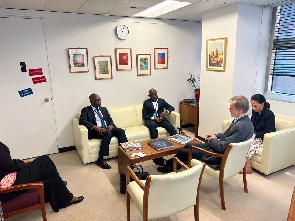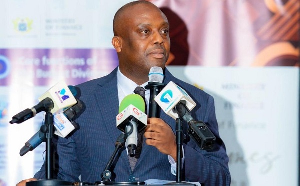The National Coordinator of the Ghana Boundary Commission (GhBC), Major General Emmanuel Kotia (PhD), on Wednesday, 21 June 2023 held talks with Mr. Vladimir Jares, the Director of the United Nations Division for Oceans Affairs and the Law of the Sea (DOALOS). The meeting forms part of the Commission‘s efforts to engage relevant local and international institutions that can help it achieve its mandate.
Opening the discussions, Major General Emmanuel Kotia indicated that his presence at the offices of DOALOS was first of all, to introduce himself, the Ghana Boundary Commission and its mandate to the executives of DOALOS; and to also forge ties of collaboration between the UN Agency and his outfit.
He revealed that it has been the vision of the African Union for its Member States to operate well-structured Boundary Commissions to ensure, among other roles, peaceful delimitation and management of maritime boundaries among Member States.
Continuing his remarks, General Kotia indicated that Ghana conducted an inspection of the common maritime boundary with Cote d’Ivoire, which was determined by ITLOS some six years ago. He further mentioned that his outfit aims to conduct same activity jointly with its Ivorian counterparts on a jointly agreed date.
General Kotia also revealed that as part of the cooperation between Ghana and Cote d’Ivoire, the Boundary Commissions of the two States will undertake a joint disposition of the common map on the maritime boundary and its coordinates to DOALOS possibly in September this year.
The GhBC Boss intimated Ghana’s renewed commitment towards the proper management, use and protection of its maritime space. He added that Ghana plans to organize an African Conference on Maritime Boundaries and the Law of the Sea; and took the opportunity to solicit the support of DOALOS in that regard.
Dr. Kotia also requested DOALOS to consider inviting participants from Ghana in all capacity-building and training activities organised by the body as means of enhancing the knowledge and skill set of the team in charge of effectively managing the maritime boundaries of Ghana.
Welcoming his guests, Mr. Vladimir Jares expressed excitement on meeting the team from Ghana and warmly welcomed General Kotia to the 2 UN Plaza building which houses the UN Division for Oceans Affairs and the Law of the Sea (DOALOS). He recounted the efforts made by Ghana in the past, particularly for being the first West African country to have fully defined the outer limits of its external continental shelf.
He continued by indicating the readiness of DOALOS to collaborate with Ghana and assured the delegation of DOALOS‘ preparedness to invite participants from the Commission for capacity building programmes, as well as technical assistance.
With regard to the deposition of maps on the maritime boundaries, Mr. Jares highlighted the introduction of a new format required by the UN with regard to the technical presentation of the map and its coordinates. He shared the guide with his guests, explaining the standardized data system used for submission to make it easier for DOALOS to work on submissions.
He expressed his outfit’s resolve to support GhBC‘s upcoming event and requested that the Commission provides DOALOS with information on the events and maritime activities so DOALOS can promote and publish its on their platforms.
The United Nations Division for Oceans and the Law of the Sea (DOALOS) discharges depository responsibilities of the Secretary-General under the Convention, other than treaty depositary functions, by maintaining and improving the existing geographic information system for the deposit by States of charts and geographical coordinates concerning maritime zones, including lines of delimitation, submitted pursuant to the Convention, and giving due publicity thereto.
It also provides capacity-building and other assistance to developing States, in particular the least developed countries, landlocked developing countries and small island developing States, as well as coastal African States, in the field of ocean affairs and the law of the sea, through training, fellowships and technical assistance, as well as through financial support from voluntary trust funds managed by the Division.
General News of Sunday, 2 July 2023
Source: Ghana Boundary Commission













